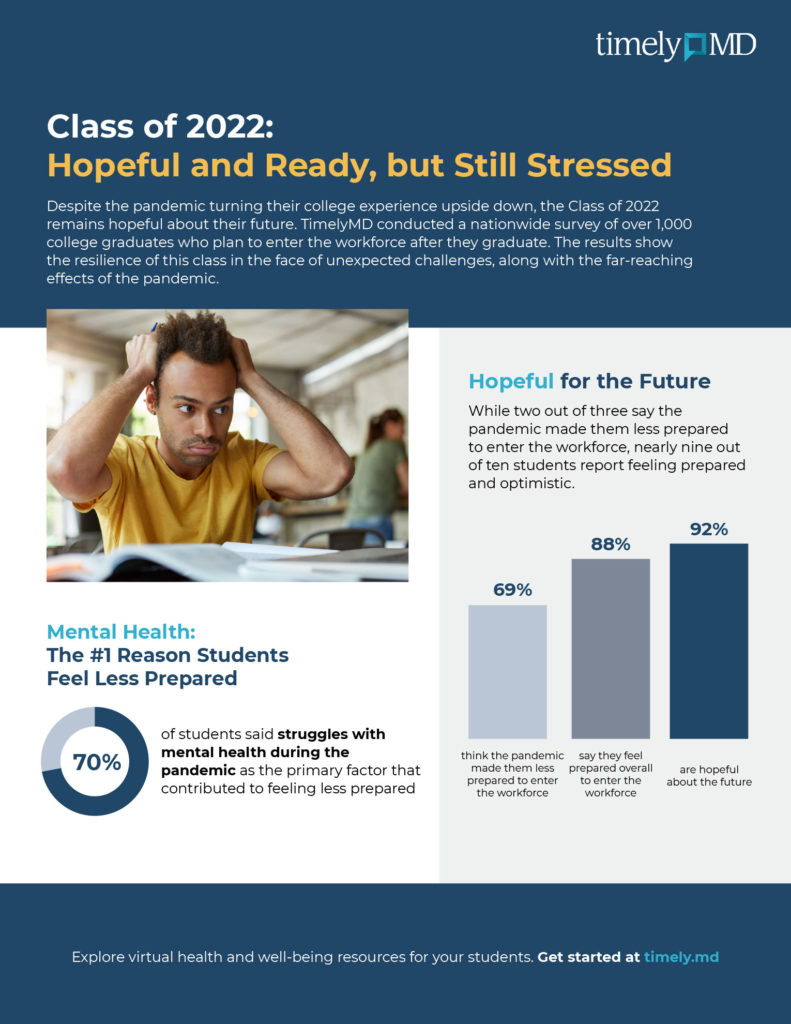Catch 2022: College Seniors Ready to Work but Feeling Stressed, New TimelyCare Survey Finds

FOR IMMEDIATE RELEASE
April 19, 2022
Contact: Katie Neal, katie.neal@timely.md, 336-662-3080
Buoyed by a strong job market, soon-to-be college graduates want flexible work options and mental health benefits
(FORT WORTH, Texas) — Nine out of 10 soon-to-be college graduates feel prepared to enter the workforce and hopeful about their futures, according to a new survey by TimelyMD, the leading virtual health and well-being solution in higher education.
The nationwide survey of more than 1,000 college seniors who plan to begin their careers as soon as they graduate found they are benefitting from a booming labor market but still wrestling with the effects of the pandemic.
Most students in the Class of 2022 want employee perks that became pandemic-era norms, including flexible hours, hybrid work options and mental health support. Despite a strong labor market for job-seekers, two-thirds of students reported feeling stressed or anxious about starting their careers.
“These insights should be a wake-up call for employers,” said Luke Hejl, TimelyMD CEO and co-founder. “Despite the excellent care they may receive from virtual, on-campus and community health centers today, college students’ mental health issues won’t vanish when they become college graduates. We must continue to prioritize their overall well-being to help the Class of 2022 make a successful college-to-career transition.”
The Bright Spots: Employers Are Hiring the Class of 2022 — and Paying Them Well
As job growth continues to outpace hiring, the survey found employers are welcoming an eager Class of 2022 with open arms and strong starting salaries.
- Career-ready and optimistic: In spite of the challenges presented by the pandemic, an overwhelming majority of college seniors said they are prepared to enter the workforce (88%) and feel hopeful about their futures (92%).
- Offer letters on the table: Nearly two-thirds of respondents (62%) already had a job lined up when surveyed at the end of March. Of the students with job offers:
- The vast majority (87%) have found a position in their desired field.
- Nearly all (93%) will earn salaries higher than (53%) or within the range they expected (40%).
- Flexibility = a key benefit: The Class of 2022 prefers flexible work options that gained favor during the pandemic.
- Graduating students said the two most important factors other than salary when considering jobs are flexible work hours (68%) and a flexible work environment (47%). Those factors ranked ahead of medical benefits (46%) and vacation time (40%).
- Though the majority (58%) prefer a fully in-person work environment, 24% would like a hybrid position and 18% want to be fully remote.
- Career development investments pay off: Three-quarters (77%) of students said they used their school’s career development office, resources or programs.
- About half of graduating students said their career development offices helped them find a job (53%) and write a resume or cover letter (50%). Improving their interview skills (35%), connecting with professionals and employers in the fields they wanted to work in (30%) and coaching them to figure out what they wanted to do after college (29%) rounded out the top five ways the career services office helped them.
“These survey results, along with Handshake’s research and insights from our community of 21 million students, have made it clear that Gen Z has a preference for flexible work options,” said Christine Cruzvergara, Chief Education Strategy Officer at Handshake, the leading early talent career network. “While remote work arrangements provide convenience and financial savings, students also acknowledge the importance of occasional face time with colleagues and managers, especially in those first couple years in the workforce. Companies who want to position themselves as attractive employers would be smart to focus on flexibility for this new generation of workers.”
“It’s terrific news to hear that the majority of college students used their school’s career development office, resources or programs during this transitional post-COVID year that required a mix of in-person, online, and hybrid experiences for employers and students to connect in new ways,” said Andy Chan, Vice President for Innovation and Career Development at Wake Forest University, a national leader in transforming the college to career experience. “However, the variety of options and unpredictable world events created additional stress and anxiety on top of student concerns related to the continuing dynamics and implications of the pandemic.”
COVID’s Long Shadow: The Class of 2022 Still Struggles with Their Mental Health
The survey made it abundantly clear that the Class of 2022 is still working through the effects of the pandemic.
- Mental health issues remain: Despite their overall optimism toward life after graduation, nearly seven in 10 graduating seniors (69%) said the pandemic made them feel less prepared to enter the workforce.
- Mental health issues (70%) are the No. 1 reason for these feelings, followed by concerns over physical health (46%) and struggles with academics (41%).
- A previous TimelyMD survey found that stress from the pandemic led nine out of 10 college students to say that their campuses were in the midst of a full-blown mental health crisis.
- Company mental health benefits are a must: Because so many students have wrestled with mental health and related issues while in college, nearly all (92%) said companies should offer mental health or emotional health benefits.
- More than a third (34%) of these new job-seekers said a company’s mental or emotional health benefits were just as important a factor for them as the availability of a 401(k) or another retirement plan (34%) and more important than a company’s mission and values (19%).
- The vast majority (92%) said colleges and universities must also provide students with mental health resources.
- What students find stressful: The Class of 2022 is feeling some nervousness about starting new careers.
- Nearly 70% said they feel somewhat (54%) or very (14%) stressed or anxious about entering the workforce. They report feeling most worried about finding and keeping a job (65%), supporting themselves financially (52%) and having to be independent and self-reliant (49%).
“Amidst their struggles, the Class of 2022 has shown resilience, adaptability and persistence in the face of unrelenting uncertainty — qualities that will serve them, and their employers, well in the long run,” said Seli Fakorzi, Director of Mental Health at TimelyMD. “Openly talking about mental health and providing resources are easy ways employers can show early-career employees that they care more about people than productivity.”
Gen Ztressed Webinar Tackles this Timely Topic
The pandemic has defined the college experience for students in the Class of 2022, but how has it impacted their career readiness? Nine out of 10 college students say there’s a full-blown campus mental health crisis. What must employers do to onboard recent graduates in the ways they need and how can colleges and universities support them?
TimelyMD’s latest nationwide survey asked the Class of 2022 about how prepared they feel to enter the workforce, the state of their mental health, and what they’re looking for from employers. Watch this webinar and join leading experts in career readiness and mental health as they explore this new data, campus trends and market resources.
About TimelyMD
TimelyMD is the leading virtual health and well-being solution for higher education. Its mission is to improve the well-being of college students by making virtual medical and mental health care accessible anytime, anywhere. TimelyMD’s virtual care platform, TimelyCare, includes a range of services, including mental health counseling, on-demand emotional support, medical care, psychiatric care, health coaching, basic needs assistance, faculty and staff guidance, and digital self-care content. Visit timelycare.com to learn how TimelyMD is inspiring the digital transformation of campus health and the future of student care.
Class of 2022: Hopeful and Ready, but Still Stressed [Infographic]


